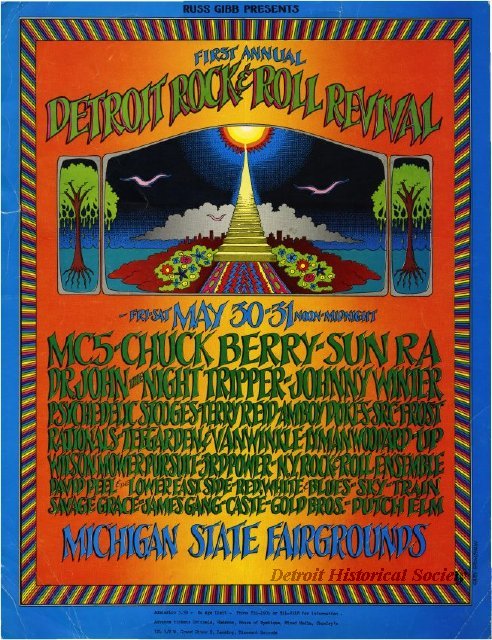Born on June 15, 1931 in Dearborn, Michigan, Russel James Gibb was a promoter of musical acts and the owner of the Grande Ballroom in Detroit. After graduating from Michigan State University with a degree in educational radio and television administration, Gibb worked as a teacher, first in Howell, then Allen Park, before becoming a full-time rock and roll concert promoter.
His first foray was hiring WKNR disk jockey Gary Stevens to work sock-hops for him at a rented UAW hall on Van Born Road every Friday or Saturday. He called it the Pink Pussycat Club and made more money on one Saturday than in two weeks of teaching. Gibbs also worked weekends at various broadcast outlets including WWJ-TV, as a floor manager, and radio stations WRBR and WKMH as a deejay. Later at WKNR-FM (Keener radio) he became known as “Uncle Russ.”
After meeting West Coast promoter Bill Graham, Gibb acquired the Grande Ballroom on Grand River Avenue in 1966, which became a local teen hangout and a home for psychedelic music. The Eastown Ballroom, the Michigan Theatre and the Birmingham Palladium were other concert sites that Gibb owned or rented, and he was an investor in a local rock ‘n’ roll magazine called Creem.
The Grande Ballroom made a name for itself through its shows with the house band Motor City 5 (MC5), and other local artists such as SRC, Iggy and the Stooges, Jagged Edge, Rationals, Frost and Ted Nugent. Nationally known artists featured at the Grande included Pink Floyd, Cream, Led Zeppelin, The Who, Janis Joplin, and avant-garde jazz artists Sun Ra and John Coltrane. The Who performed their rock opera, Tommy, for the first time ever at the Grande. Frequently, these performers were advertised with the psychedelic handbills of Gary Grimshaw and Carl Lundgren.
Gibb is perhaps best known for perpetuating the “Paul is dead” myth about Beatle Paul McCartney. In 1969, as a deejay for WKNR-FM, a caller claimed McCartney was dead and the Beatles were hiding it. Along with co-worker Dan Carlisle, Gibb explored various “hints” in Beatles songs that could be construed as evidence of McCartney’s demise, resulting in much publicity for Gibb and the station.
Gibb moved from the Grande to the Grande Riviera, around the corner, in 1969. The Grande closed in 1972, and the building has not been in use since. Before returning to teaching, Gibb was the National Director of Youth and Education on the U.S. Bicentennial Commission under President Gerald Ford.
Gibb spent 30 years teaching video and media production at Dearborn High School. He began their video program that grew into a state-of-the-art facility, boosted when he aided in acquiring $2 million worth of equipment. The school produced hundreds of award-winning video students (known as Gibblets), many of whom have gone on to careers in the media business. The video studio, the first in a U.S. high school, is named in his honor. Russ Gibb died on April 30, 2019.
